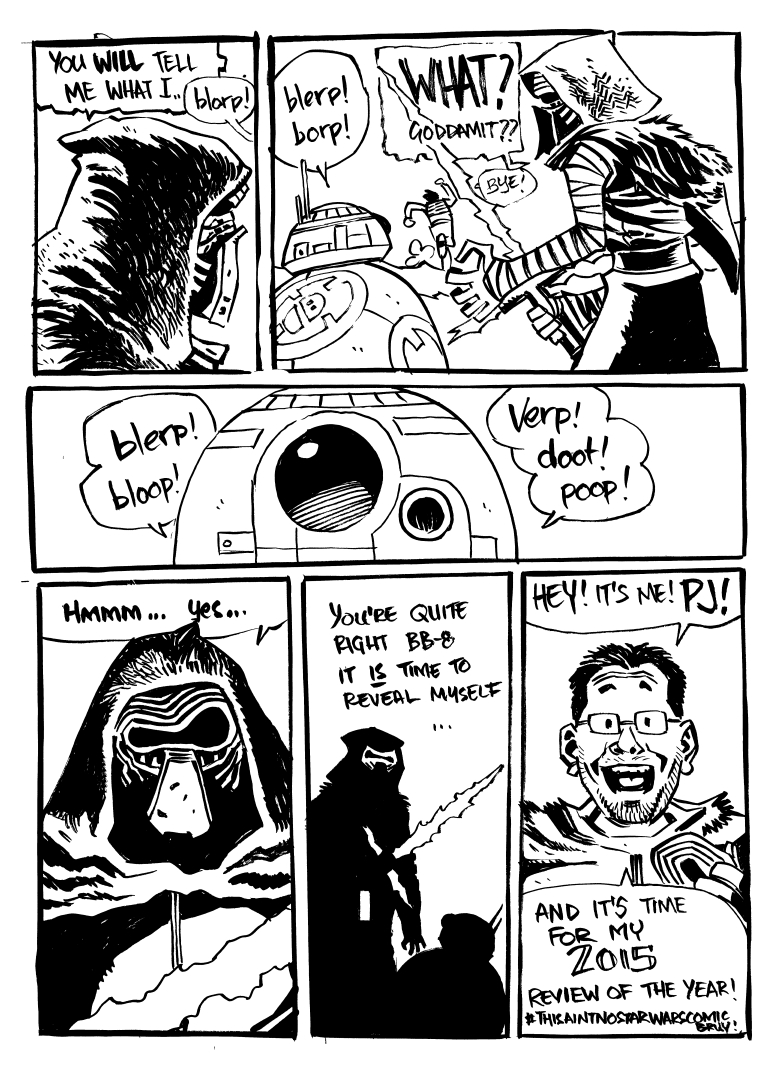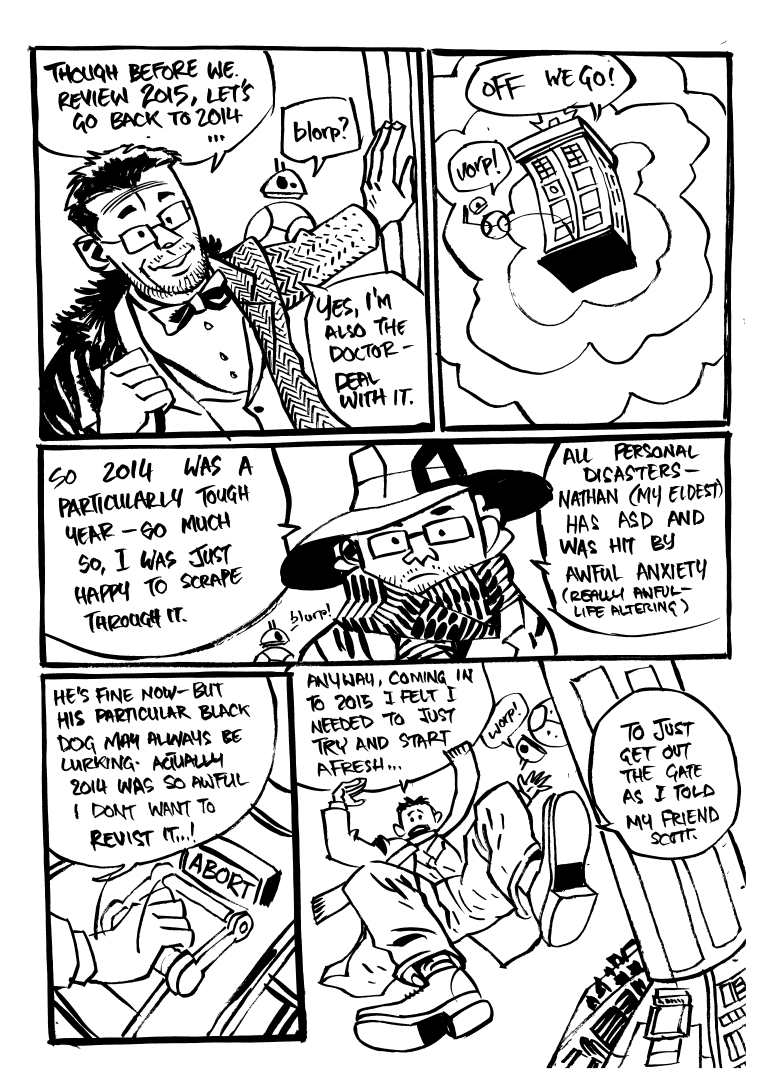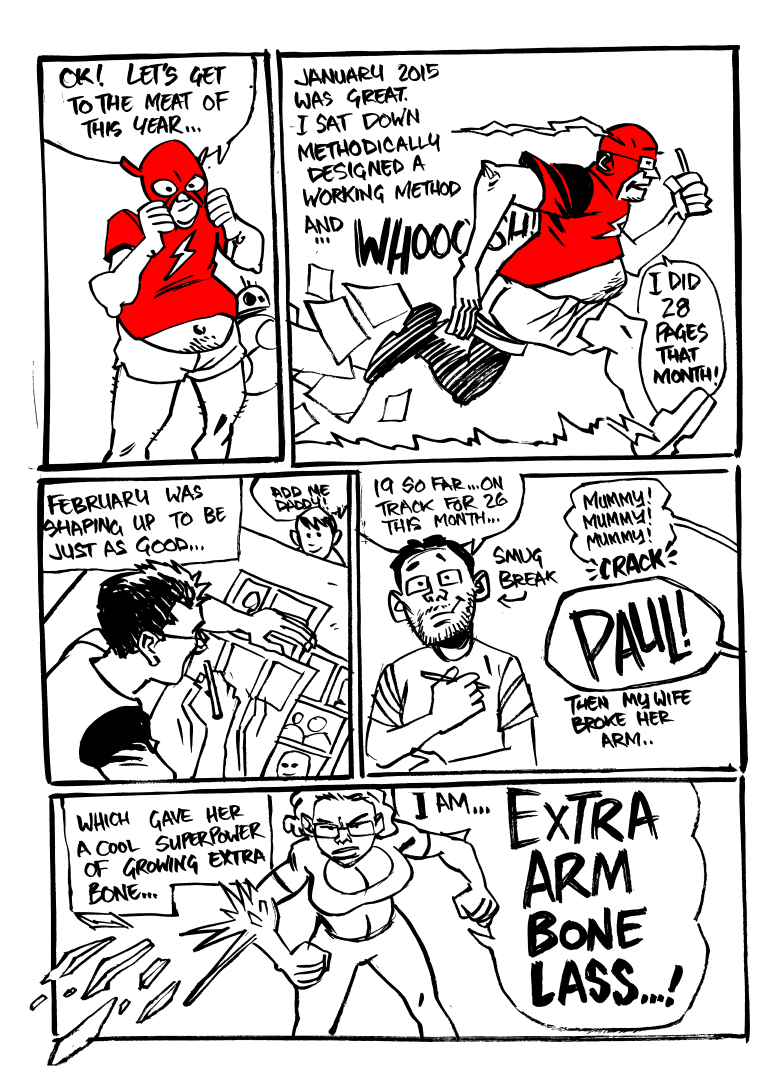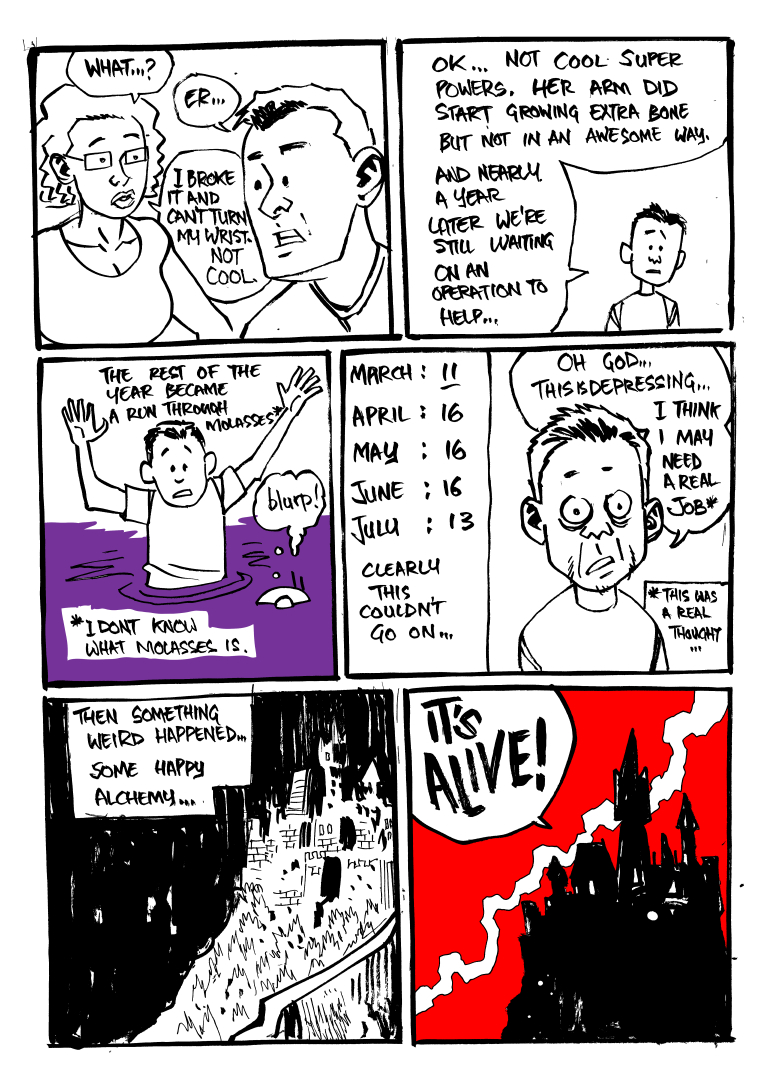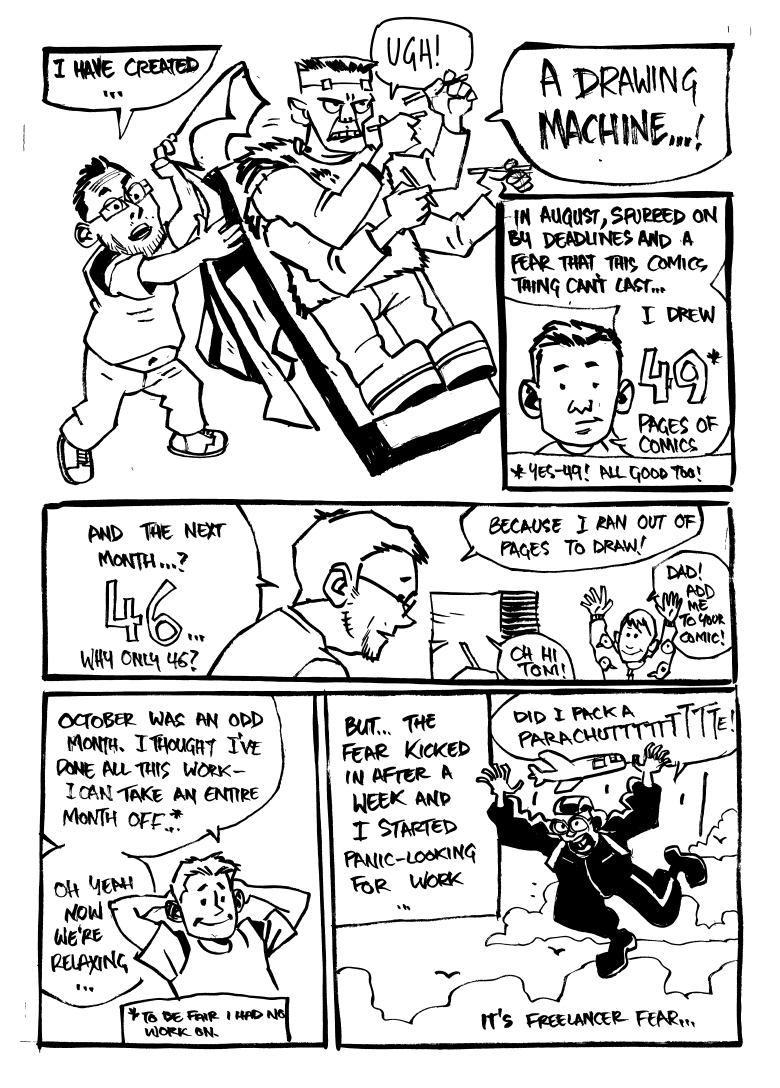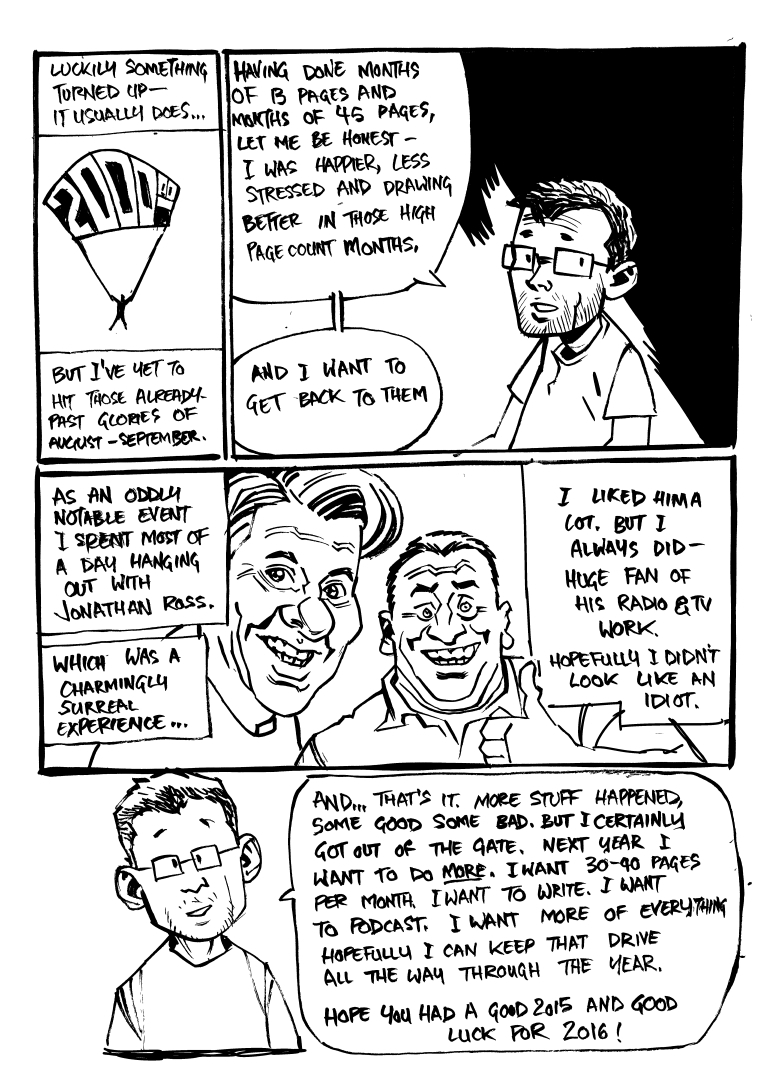With me and Si Spurrier. I can’t remember where this ran, so forgive the uncredited nature of it. But it might be fun..
So the book has been described as “a time-twisting romantic thriller-noir metaphysical black comedy”. Can we expect a lot of dark humor?
SS: Heh, yeah, describing the book in genre terms has become something of a joke in itself. It doesn’t really sit terribly neatly in any single category… which is either a demonstration of how horribly inadequate genre terminology is, or a sign that PJ and I are contrary bastards who don’t like pigeonholes. To your description above I’d also add a hint of sci-fi and a glimmer of crime, but yeah… “time-twisty metaphysical rom-com thriller” covers most of the bases.
It’s basically the story of a man who breaks all the rules of existential reality in order to be reunited with the woman he loves… except told from the point of view of the violent thug sent by the Divine Authority to stop him.
Hence, yeah, a typically bleak humour suffuses the whole thing. I tend to think of comedy as a glue which bonds together all kinds of supposedly disparate ideas and moods, and as a secret weapon for reconciling important themes, heavy moments, explodo action, etc. There’s nothing more delightful than taking readers by surprise, and having a constant undercurrent of dark smirk-inducement allows you to do just that.
PJ: We’re both steeped in the 2000AD school of story telling, which is pretty much nothing but deep veins of rich black humour. Plus, I’m from Northern Ireland where there jokes are usually measured in how bleak they are.
Can you tell me anything about the Karmic Accountancy or the Divine Calculator – without going into spoiler territory, of course!
SS: The Karmic Accountancy is our cynical, abstract notion of what it’s like “behind the scenes” of the Universe. It’s part afterlife, part administration, part engine-room. It’s basically the place where all the colour and beauty and awe of life/reality/existence is reduced to a set of rules and regulation. And numbers in a book. And petty-minded arseholes in pinstripe suits endlessly stamping forms, passing round bits of paper, etc. It’s Brazil with added ontology. It’s what Heaven would look like if it turned out God was an anally-retentive ratlike accountant obsessed with neatness, precision and bureaucracy.
…which is precisely what he is, in this story. The Divine Calculator: a supreme being with a horrible laugh, big ears, halitosis and a cat called Mimpsy. I’ll let PJ wax lyrical about the visual inspiration for all these things, but… yeah: it’s all about juxtaposing all the good things in our story – love, life, happiness, devotion – with this soulless joyless abstraction of metaphysical shittiness.
PJ: Its always fun working from Si’s scripts – he’ll often throw in big abstract concepts that leave you scratching your head thinking “how the hell do I draw THAT”? But, visually, I think Si gave me enough cues to just sit down and draw. Oddly the real world was more of challenge. The afterlife, the Karmic Accountancy, was just super busy and lots of detail and very fun to draw. The real world, though. That was tough.
Every time I get a look at Bastard Zane, I see endless possibilities for storytelling. He looks like a guy that has a lot of stories in him! Will we learn anything about Zane, or is this really the Mathematician’s story?
SS: Ha. Both, weirdly. It is the Mathematician’s story – sort of – but the whole thing is told from Zane’s point of view. We get to know a little bit about the guy at the start, but broadly speaking he’s a cipher: a relentless brute whose motives for preventing the Mathematician’s romantic quest are at least as strong as the romance itself. That said, by the end of the book we’ve realised Zane has some unexpectedly deep waters – not that that will stop him from pursuing his mission.
The whole thing is kind of an exercise in screwing about with expectation and conventions. And Zane’s just so brutishly likeable – it was impossible not to tell the story through his eyes.
This was originally a black and white work. Did you find any challenges when you decided to make the work color? Do you feel like it changes the noir feel of the book at all, or did the noir feel of the original art inform your color choices?
SS: I’ll let PJ field that one, except to say that we always had it in mind that the art would eventually be coloured – or at least, partially coloured along cunning Powell-and-Pressburger lines…
PJ: As Si said, we started wanting it coloured, but time and resources were the enemy. So, in the end I went with a greywash afterlife and a very stark black and white real world (reasoning if we managed to procure the services of a top notch colourist, having the coloured artwork in pure b&w will be the best thing. And now we have the wonderful Jordie Bellaire on board for colours I’m more than happy!)
Is Numbercruncher influenced by your own reading tastes? Do you enjoy noir and black comedy?
SS: Yeah, I suppose it is – though not directly. My tastes tend towards the unlikely, the ungainly and the unconventional: mashups of genres and ideas which shouldn’t be comfortable bedfellows but somehow manage to be just that. I like speculative fiction in which the big world-building stuff is incidental to a smaller, more human story. I like the Bladerunners and the Brazils of the world. I like stories where the Big Idea (“the afterlife is a gigantic accountancy!”) is just the starting point from which all subsequent insanity spills.
It’s weird to say this, because I’m not a huge fan of the Sin City books (they’re gorgeous to look at – don’t get me wrong) but it’s a no-brainer that Bastard Zane is a spiritual cousin of Marv. There’s something so wonderfully appealing about these big unstoppable diamond-in-the-rough slabs of meat characters. I wondered how far we could push the “loveable bastard” trope before the “loveable” bit became unsustainable. Zane’s job in this story is – basically – to prevent the happy ending. And yet, reading back through it, I’m pretty pleased about how easy it is to root for the guy.
PJ: Artwise, it was less influence from reading and more influence from movies. The Powell-Pressburger “A Matter of Life and Death” especially (though there are plenty of other B&W or colour movies dealing with the after life). Though, they were less a direct influence and much more me pulling memories of those films out of my childhood.
What types of comics and books are you reading and enjoying artwork for?
SS: I’m pretty bad at keeping up with monthlies these days (though I’m loving David Hine and Doug Braithwaite’s Storm Dogs, and I can’t believe you – yes you, reading this right now – aren’t picking it up). So most of what I read is in collected form, which gives me the slightly dubious privilege of ignoring fads and picking from ACROSS TIME’S MIGHTY SPAN. For instance, I only just got around to Brian Wood’s Northlanders, which is splendid. Alan Moore’s Neonomicon from Avatar is a characteristically intelligent retooling and – I suspect – affectionate ribbing of (the overrated) Lovecraftian mythos. Oh, and I only just discovered Joe Sacco. Joe Sacco! Safe Area Gorazde might be one of the best things I’ve ever read.
PJ: 2000AD, always, always 2000AD. I’m looking forward to seeing Stephen Mooney’s Half Past Danger, and Pat Mills and Kev O’Niell’s Marshall Law Omnibus has just arrived in my house and will probably sustain me for comics over the summer.
I see that Numbercruncher is currently scheduled to be a 3-book series. Do you see yourselves continuing the run if it receives positive feedback?
SS: It’s a four-part run, actually – I think there was a minor FUBAR in early solicits. But, well – we’ll see. The first series is a remarkably twisty beast which (I tend to think) rather presupposes that it has a definite ending. Buuuut there are a few threads left dangling, and I suppose there are still a couple of genre conventions PJ and I haven’t kicked in the balls yet, so never say never.
PJ: I think we run a pretty tight ship on this series – and things are very cleanly wrapped up, so I doubt there’d be room for a sequel, but, you know, Zane was working in the Karmic Accountancy for a long, long time. So who knows..

